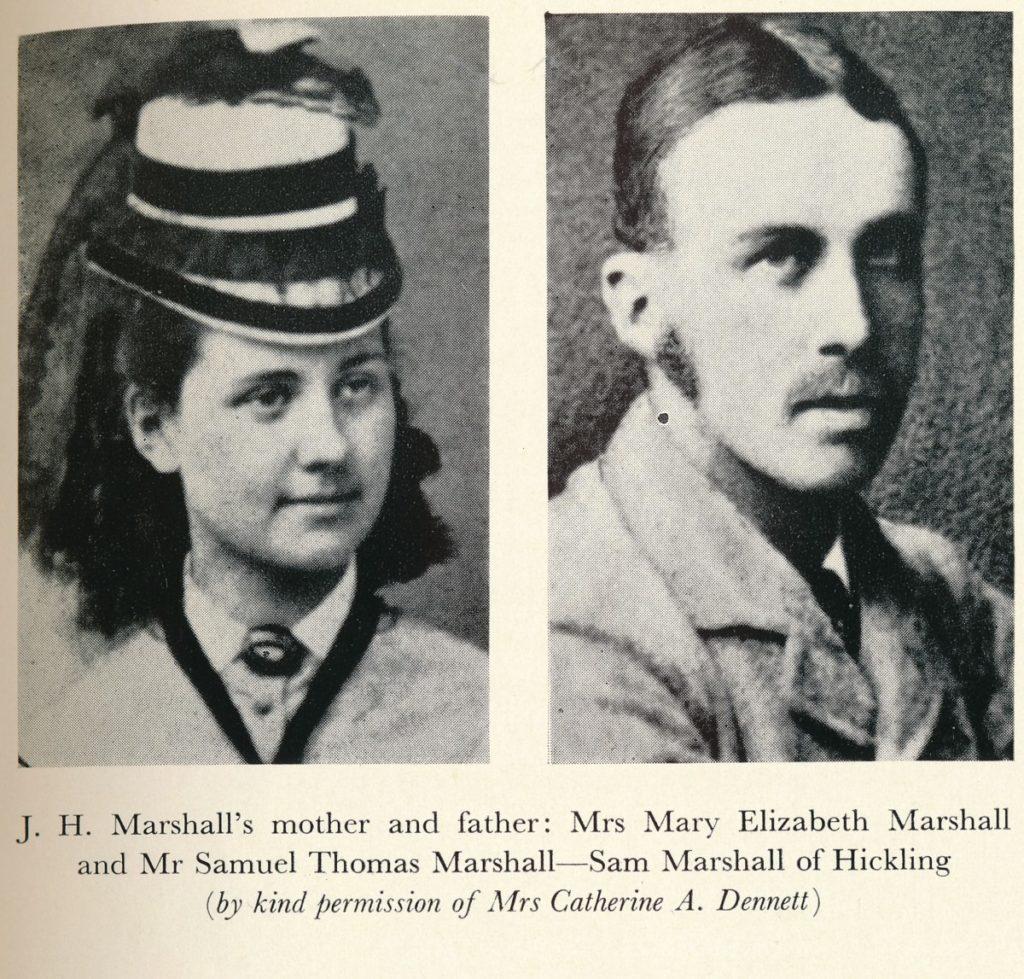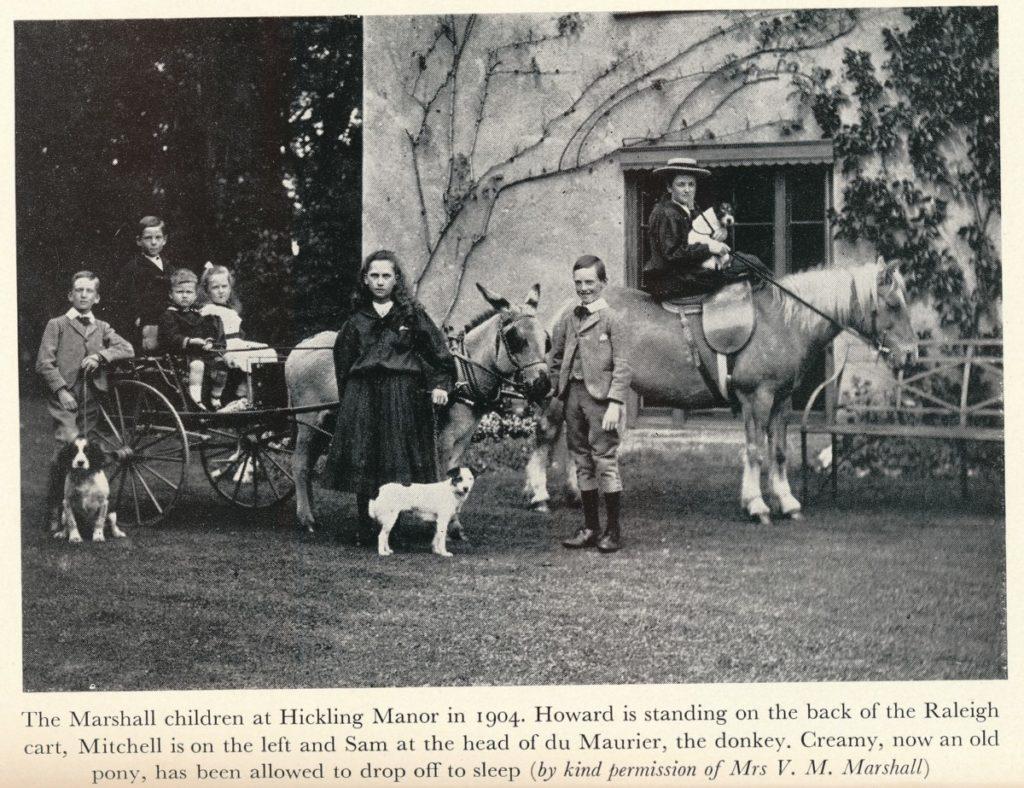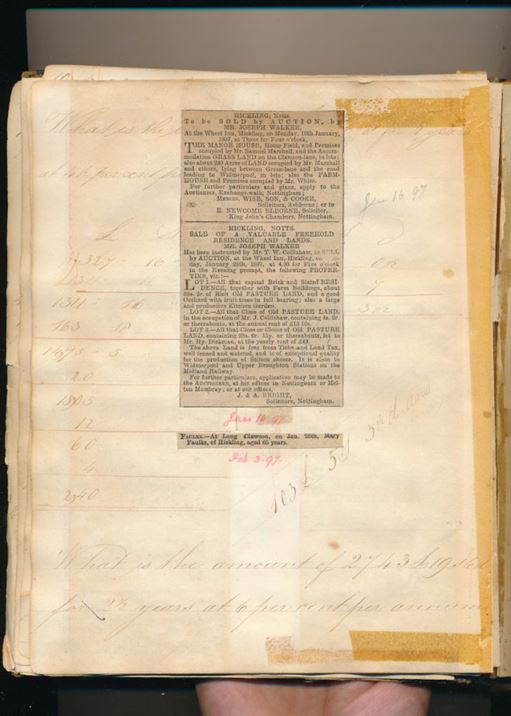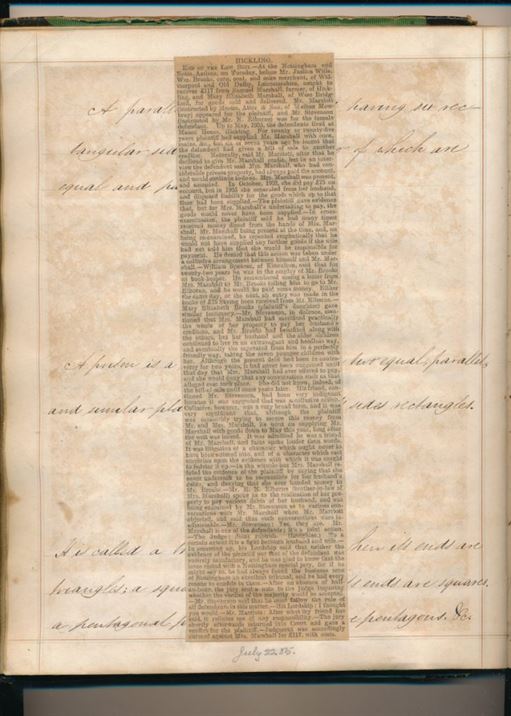Please note: Family pages are organised by surname; however, this does not mean that all those people featured are related to each other. Where possible we will try to be clear about any connections there may be.
The Marshall families of Hickling.
We have only conducted a first (and very brief) search into the Marshall family in Hickling; we hope to include more at a later date. At present we are aware of the following separate families with the Marshall surname:
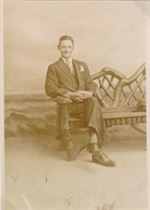
- There are Marshall family records in Hickling before the 1841 census; further detailed work is needed to place the various individuals in the right parts of their respective families.
- The Marshall family from the Manor House who we think were present in Hickling from the 1840s until 1915.
- The family of Samuel Marshall (born Kinoulton 1811) and living in Hickling by 1841 when the census records that he is a farm labourer. His family seems to remain in Hickling until the early 1880s.
- Harry Marshall who lived on Smithfield Lane (now Bridegate Lane) in 1930; he was the servant of Mrs Mabel March and was injured in the car accident which killed her in July 1930 – his photograph is ref’d W0409. At the time of the accident he was age 22 – there is no record of him in Hickling in the 1939 Register and we have no further detail of his birthplace or origins.
- The Wadkin archive records that a builder, John Marshall, bought a number of houses and cottages for renovation in the 1970s (see gallery, below); Mill Cottage, Mill Lane and The Wheelhouse, Main Street.
- We are also searching for any information relating to Nancy Marshall born c.1921 – please contact us if you can help.
The family of Samuel Marshall (labourer):
Samuel Marshall is first listed in Hickling in the census of 1841; he is listed as a labourer and he was born in Kinoulton. The information that we have, so far, comes from a first search of census & parish records but there are inconsistencies & detailed checking is needed to confirm what we seem to have found – if you are able to assist with adding to or correcting these notes, please contact us.
- Samuel Marshall appears to have been widowed young (first wife Jane Paget; possible death record 1848) and re-married; his second wife is named Mary (confusingly, this means there are two couples in Hickling, both named Samuel and Mary Marshall).
- Census 1841; Samuel, Jane and their daughter, Mary – their details tally with the next 1851 census records.
- Samuel and Jane have at least three children; Mary (b.1840) Elizabeth (b.1842) and Harriett (b.1844); in the 1851 census, Samuel’s mother-in-law is housekeeper, Lucy Allen (born Waltham 1783) – note, we would expect his mother-in-law’s surname to be Paget (further research is needed).
- 1861 census; possible record of Harriett Marshall working as a domestic servant for the Davies family on Hickling Pastures – no record found in Hickling after this date.
- Mary and Elizabeth don’t appear to be recorded in Hickling after the 1851 census. It is possible that they left with their grandmother when their father re-married or that they married themselves – further checking is needed.
- (Possible link between Lucy Allen in this household and Ann Allen servant at the Manor in census 1871?)
- Samuel and (second wife) Mary have at least one son, Thomas (born 1853) and one daughter, Emma (born 1860).
- Thomas Marshall; son of Samuel and Mary Marshall – baptised 3rd May 1853, Hickling.
- There are a number of possible marriages; Mary Pidd, Mary Ann Hodgett, Mary Mees.
- Thomas seems to be in Langar in census records for 1871 & 1881 (mis-recorded as Norfolk – with his wife Mary & children Annie (b.1872), Sam (b.1875), Tom (b.1877) & Mary (b.1879) (all born Barnstone which neighbours Langar).
- No further records found in Hickling.
- NB. Some confusion with a Cotgrave family – Thomas & Mary Marshall of similar dates.
- Samuel Marshall’s records persist in Hickling through to the census in 1871 and there is a possible burial record for him in Hickling; burial 5th July 1880, died age 70.
- His widow Mary is listed alone in household in the 1881 census and there is a possible burial record for her in Hickling – 26th Feb 1883.
- No records found, so far, for this family in Hickling after 1883; however, further research is needed.
The Marshall family at The Manor.
Generation 1:
Samuel Marshall was born in 1822:
- Likely baptism record; Samuel Howard Marshall, baptised 11th October 1821, St Mary de Castro, Leicester. Parents; John and Letitia Marshall.
- Census 1841: no record found
- Samuel Howard Marshall married Hannah Hardy in Hickling; 15th June 1843.
- they married in a double ceremony in which Hannah’s sister Ann married George Daft. [Q2 1843 Bingham Vol 15 page 681]
- Died Q3 1875, age 53
Hannah Hardy was born in Hickling in 1812
- baptised 26th December 1812 in Hickling
- Parents Robert and Ann (Shilcock) Hardy (married in Hickling, 25th Feb 1805).
- Census 1841; Hannah Hardy is not listed in Hickling. There is a possible census record in Sutton Granby, Bingham: Elizabeth Musson (farmer, age 60), Joseph Pike (servant, age 15), Emily Bateman (servant, age 15), Hannah Hardy (independent, age 25), Joseph Brookhouse (hosier, age 35)
- Census 1841; Hannah’s parents, paternal uncle and siblings are recorded in Hickling, also, 4 servants in the household.
- Probate record for Robert Hardy (Hannah’s father) January 1846, death Q4 1842: his Will and probate are transcribed in the website Wills pages.
- Farmer and butcher
- His Will makes provision for his widow and children – Robert, John (a parcel of land – Bridegate Close and £600), Ann, Jane and Hannah (£400 each).
- His son, Robert, is the residuary beneficiary
- Further research is needed but it seems likely that the Hardy family were resident at The Manor at this time; however, research is also needed to establish why Hannah & Samuel take up residence instead of one of her older siblings.
- Hannah’s older brother, Robert (born 1806) remains in Hickling (farmer of 120 acres) in census records for 1851, 1861 and 1871 and a death record in 1880. He didn’t marry and is in his mother’s household before becoming head of household with his unmarried sister, Jane, as housekeeper.
- There is a possible marriage record for Ann Hardy (to George Daft 1843) followed by a possible death record in 1851; if this is the case, Hannah may have been the only sibling with a family which may explain why they were resident in the old family home, The Manor.
Census 1851:
- Samuel Marshall – age 29 – born 1822, Leicester – farmer of 250 acres, employing 5 labourers
- Hannah Marshall – age 38 – born 1813, Hickling
- John Marshall – age 6 – born 1845, Hickling
- Robert Marshall – age 6 – born 1845, Hickling
- Anne Marshall – age 4 – born 1847, Hickling
- Letitia Marshall – age 3 – born 1848, Hickling
- Joseph Marshall – age 2 – born 1849, Hickling
- Hannah Marshall – no age given – born Hickling
- Also servants; Edward Cooke (age 33 born Claxton), Henry Morris (age 16, born Hickling), Hannah Musson (age 27, born Hose), Ann Smith (age 30, born Hickling), Mary Thurman (age 18, born Hickling), Jane Starbuck (age 13, born Hickling).
Scarlet fever outbreak: John and Robert, age 10, and Harriet Jane, age 2, all died within a week of each other in January 1855 in an outbreak of Scarlet Fever which caused 7 deaths in Hickling (see gravestone images, below). Harriet Jane is not found in census records but she appears to have been born in 1853.
Census 1861 adds:
- Samuel Marshall now farms 340 acres
- Charlotte Marshall – age 6 – born 1855, Hickling
- Samuel Marshall – age 5 – born 1856, Hickling
- Also servants; Jane Aley (Governess, age 24, born Allesley, Warks), Sarah Feiling (Dairy Maid, age 23, born Broughton, Notts), Mary Copley (housemaid, age 19, born Hickling), John Walter (cowman, age 20, born Nottingham), Herbert Ward (plough driver, age 15, born Goadby Leics)
Census 1871:
- The household is located at Hall Yard House; this may be a clue to the background of the Manor and its naming (to be confirmed)
- Anne, Letitia, Joseph, Hannah and Charlotte remain in the household
- Also servants; Hannah Musson (age 22, born Leics – note coincidence of names 1851 census), Ann Allen (age 16, born Notts)
- (Possible link between Lucy Allen in the other Marshall household and Ann Allen servant at the Manor in census 1871?)
Census 1881:
- Hannah Marshall is now widowed (age 67) – landowner
- Joseph and Hannah remain in the household
- Also servants: Elizabeth Smith (age 20, cook, born Kinoulton) and Samuel Rippin (age 19, groom, born Hickling).
By 1891 second generation Samuel is in residence at The Manor with his family; they seem to have lived in Upper Broughton after his marriage and move to the Manor House after the death of his mother in 1883 (burial record, 11th October 1883). Further research is needed to explain Samuel’s move to the Manor but it would seem that all his elder brothers pre-deceased their father (see Marshall family gravestones, below).
- Joseph Marshall continued to live in Hickling; he died in 1898 and was buried in Hickling churchyard
- In 1891 – three of Samuel and Hannah’s daughters are living at the Yews in Upper Broughton, Notts
- Letitia Marshall 45yrs farmer born Hickling
- Hannah Marshall 40yrs sister “
- Charlotte Marshall 36yrs sister “
- + 2 servants
- Hannah died suddenly at Overbank in Upper Broughton on 13 October 1895 and was buried in the family plot in Hickling.
- On 30th April 1891 in Upper Broughton, Charlotte Marshall married John Henry Hind [1861-1946] a veterinary surgeon. The couple had a daughter, Clara Letitia Hind
- At this time people were discovering the ‘seaside’ and visiting the coast for holidays. Charlotte and Letitia Marshall went into partnership and ran a boarding house in Skegness. They are found in Skegness in 1901 and 1911 census returns
- 1901 Glatton House North Parade Skegness
- Letitia Marshall 53yrs house proprietor born Hickling Notts
- Charlotte Hind 44yrs partner “
- + family and guests
- Letitia Marshall died in Skegness in 1911
Generation 2:
Samuel Howard Marshall was born in Hickling in 1856; parents Samuel and Hannah Marshall (generation one, above).
- Further research is needed to explain Samuel’s move to the Manor but it would seem that all of his older brothers pre-deceased their father (see Marshall family gravestones, below).
Samuel Marshall married Mary Elizabeth Mitchell in Long Clawson, 19th April 1881; there are twelve known children (further research needed to confirm currently available information and to add detail):
- Hannah Mary Marshall – baptised 28th February 1882 in Upper Broughton (doesn’t seem to have married)
- Margaret Elizabeth Marshall – 1884, Upper Broughton
- Samuel Thomas Marshall – 1886, Upper Broughton
- Albert Mitchell (known as Mitch) Marshall – 1887, Upper Broughton
- John Howard Marshall (known as Howard, author of ‘The Horseman’) – 1889, Hickling
- Alice Adelaide Marshall – 1891, Hickling (married name, Harrison – died 1919)
- Edith Harriet – 1892, Hickling
- Joseph Wise Marshall – 1894, Hickling
- Richard Hardy Marshall – 1896, Hickling
- Edward S Marshall – 1898, Hickling
- (?) Leonard Edward Marshall – 1898, Hickling
- Catherine A Marshall – 1901 (married name Dennett).
Sadly, Samuel and Mary Marshall’s marriage seems to have been tempestuous and they finally separated in about 1903 when Mary moved out with the youngest children – settling in Hoveringham and then West Bridgford. In 1905 a lively news report details their relationship and Samuel’s debts and in 1915 Samuel commits suicide.
“The Horseman; Memoirs of JH Marshall”
The memoirs of John Howard Marshall (known as Howard) were published in 1970 and whilst they are completely focused on his life with horses, they do include details about the family and some wonderful descriptions of individuals and places in Hickling during his childhood – he was born in Hickling in 1889 and the family leave the Manor House in 1915.
- He describes his parents as ‘handsome and headstrong’.
- Several anecdotes build a colourful picture of his parents and the household (including descriptions of the inside of the house).
- There are frequent references to his two older brothers and we are told something of their characters but nothing about his sisters or younger siblings (except in general terms and in passing – for example, when he is driving them somewhere in his pony cart when the pony or donkey is named but his sisters are not).
- Long sections of the book record agricultural shows, point-to-points and hunting in the area.
- His writing reveals a deep love of Hickling and the surrounding countryside and a genuine sense of loss when the family connection with the village is lost.
Hickling extracts can be found by clicking this book cover thumbnail:
Copies of his memoirs are often available second hand; Abe Books is a useful online platform for second hand booksellers.
We are looking for help with transcribing and indexing the Hickling sections of these memoirs (so that links can be put in place for anecdotes referring to other families and houses in Hickling at the time); please contact us if you can help.
We are currently working on the Marshall family history; specifically we are researching Hannah Mary Marshall and the family’s time in Hoveringham. Please contact us if you can help us with this research.
Marshall Family – in the news:
Joseph Marshall – assault
“In 1879 Joseph Marshall was charged by Joseph Starbuck with assault at Hickling, Starbuck claiming that Joseph got hold of him, shook him and knocked him against a wall because of a dispute about a dog. Joseph claimed self-defence and said that Starbuck was impertinent, but Starbuck was believed and a fine of 7s6d was levied.” (unknown source)
1879 – Church Court (source to be confirmed)
Rector Causes Upset in Hickling
Visitation of Archdeacon of Nottingham, Rev Canon Maltby, at Southwell Minster. Churchwardens afterwards met at Chapter House. Then on Tuesday met at St Mary’s Nottingham and presentments were taken by Archdeacon. Collishaw and Price, churchwardens of Hickling made a presentment which was not read but was understood to make “certain grave allegations against the incumbent” [William Henry Edwards]. Archdeacon said he thought they had got to a better understanding lately than some time ago. Mr Price said, “In what way? He never speaks to any of us.” Price confirmed that there had been a contested election and he [Price] had got a large number of votes. He said rector now wants to stop the organ, we want to have it played by a respectable person, but the rector says that the churchwardens must eject the Marshall family from the chancel and there are letters here on the subject. Archdeacon asked if it were true that rector wanted to eject part of the congregation from the chancel and Price said he wished to eject those in the choir and playing the organ – the Marshall family I mean. Price confirmed that the rector had not ejected the whole choir, just the Marshall family who have been in it for many years. Archdeacon said rector was entitled to eject any family from the choir. Collishaw said they are the principal supporters of the church in the village. Archdeacon said incumbent has power to discharge from the chancel and asked why this had happened. Mr Price spoke to Canon Morse: “Mr Morse, you will remember me coming to your house, and asking for a fresh parson for Hickling, because this one was drunk. You took hold of my coat and asked me all about it, because I would not tell you at first, and then I told you?” Morse confirmed this. Archdeacon said Mr Edwards was suspended but Price said he was not. Archdeacon said, then he went away. Price regretted not speaking the truth about Edwards until Morse got it out of him. Archdeacon thought he should have a special inquiry with Edwards in attendance, he had all the papers and we shall adjourn the case until then, Archdeacon would communicate with churchwardens shortly.
(Grantham Journal?) 22nd July 1905
End of the Law Suit – At the Nottingham and Notts Assizes on Tuesday, before Mr Justice Wills. Wm. Brooks, corn, coal and coke merchant, of Widmerpool and Old Dalby, Leicestershire, sought to recover £117 from Samuel Marshall, farmer, of Hickling, and Mary Elizabeth Marshall, of West Bridgford for goods sold and delivered. Mr Marriott (instructed by Messrs Atter & Son of Melton Mowbray) appeared for the plaintiff, and Mr Stevenson (instructed by Mr N Elborne) was for the female defendant. Up to May 1903 the defendants lived at Manor House, Hickling. For twenty or twenty-five years plaintiff had supplied Mr Marshall with corn, maize etc but six or seven years ago he learnt that the defendant had given a bill of sale to another creditor. Naturally, said Mr Marriott, after that he declined to give Mr Marshall credit but in an interview the defendant said Mrs Marshall who had considerable private property, had always paid the account, and would continue to do so. Mrs Marshall was present and assented. In October 1902 she did pay £75 on account but in 1903 she separated from her husband and disputed liability for the goods which up to that time had bee supplied. The plaintiff gave evidence that but for Mrs Marshall’s undertaking to pay, the goods would never have been supplied. In cross-examination the plaintiff said he had many times received money direct from the hands of Mrs Marshall, Mr Marshall being present at the time, and, on being re-examined, he repeated emphatically that he would not have supplied any further goods if the wife had not told him that she would be responsible for payment. He denied that this action was taken under a collusive arrangement between himself and Mr Marshall. William Spencer of Kinoulton said that for twenty two years he was in the employ of Mr Brooks as book-keeper. He remembered seeing a letter from Mrs Marshall to Mr Brooks telling him to go to Mr Elbourne and he would be paid some money. Either the same day or the next an entry was made in the books of £75 having been received from Mr Elbourne. Mary Elizabeth Brooks (plaintiff’s daughter) gave similar testimony. Mr Stevenson, in defence, mentioned that Mrs Marshall had sacrificed practically the whole of her property to pay her husband’s creditors and Mr Brooks had benefitted along with the others, but her husband and the older children continued to live in an extravagant and heedless way and eventually she separated from him in a perfectly friendly way taking the seven younger children with her. Although the present debt had been in controversy for two years, it had never been suggested until that day that Mrs Marshall had ever offered to pay, and she would deny that any conversation such as that alleged ever took place. She did not know, indeed, of the bill of sale until some years later. His friend, continued Mr Stevenson, had been very indignant because it was suggested that was a collusive action. Collusive however was a very broad term and it was very significant that although the plaintiff was ostensibly trying to secure this money from Mr and Mrs Marshall he went on supplying Mr Marshall with goods down to May this year long after the writ was issued. It was admitted he was a friend of Mr Marshalls and facts spoke louder than words. It was litigation of a character which ought never to have been entered into and of a character which cast suspicion upon the evidence with which it was sought to bolster it up. In the witness box Mrs Marshall refuted the evidence of the plaintiff by saying that she never undertook to be responsible for her husband’s debts and denying that she ever handed money to Mr Brooks. Mr EN Elborne (brother-in-law of Mrs Marshall) spoke as to the realisation of her property to pay various debts of her husband and was being examined by Mr Stevenson as to various conversations with Mr Marshall when Mr Marriott objected and said that such conversations were inadmissible. Mr Stevenson: Yes, they are. Mr Marshall is one of the defendants; it’s a joint action. The Judge: Joint rubbish. (laughter) To a certain extent it is a fight between husband and wife. In summing up, his Lordship said that neither the evidence of the plaintiff nor that of the defendant was entirely satisfactory and he was glad to know that the issue rested with a Nottingham special jury, for if he might say so, he had always found the businessmen of Nottingham an excellent tribunal, and he had every reason to confide in them. After an absence of half-an-hour, the jury sent a note to the judge inquiring whether the verdict of the majority would be accepted. Mr Stevenson said that he must follow the rule of all defendants in this matter. His Lordship: I thought you would. Mr Marriott: After what my friend has said, it relieves me of any responsibility. The jury shortly afterwards returned into Court and gave a verdict for the plaintiff. Judgement was accordingly entered against Mrs Marshall for £117 with costs.
Melton Mercury 22nd October 1908
“Melton Mowbray County Court
Friday before His Honour Judge Wightman Wood Dispute over a suit of clothes – Frank Quinn, tailor, Leicester and Melton Mowbray sued Samuel Marshall, jun., of Hickling, and Mrs Samuel Marshall of Nottingham, his mother, for £4 4s, the value of a suit of clothes. Mr Biggs of Leicester appeared for plaintiff and Dr Tinsley Lindley instructed by Mr Elbourne of Nottingham for Mrs Marshall. It was pointed out that in the first instance plaintiff sued Samuel Marshall jun who submitted that his mother gave him the clothes as a birthday present and was therefore liable for the debt and the case was adjourned in order that she might be added as a defendant in the action. Plaintiff now stated that the clothes were supplied to Samuel Marshall on a written order from his mother but as she refused to pay on the ground that her son had come into some money and was able to provide for himself now he was of age, he in the first instance sued Samuel Marshall. He had invariably declined to make any clothes for the young Marshalls without a written authority from their mother. On receiving a letter from Mrs Marshall instructing him to make a suit of clothes for her son Samuel, he wrote to the latter informing him of the fact and in due course executed the order. In cross examination, he said he had received several letters from Mrs Marshall and Mr Elbourne her solicitor between November 1904 and October 1906 ordering suits of clothes for her sons. Unfortunately, he had mislaid this particular letter. In October 1906 he made a suit of clothes for H Marshall and the cost £3 15s had been paid by Mrs Marshall’s solicitors. S Marshall jun said when he came over to Melton plaintiff showed him his mother’s letter authorising him to make the suit of clothes. They were promised to him as a birthday present but she now declined to pay for them on the ground that he had means of his own. Cross examined: His mother lived at Nottingham, and he resided with his father at Hickling. Mrs Marshall admitted that she had allowed her son Samuel to have several transactions with Mr Quinn and that she promised him a suit of clothes on his birthday but he said what she wanted him to have were not good enough so he would not have them. On no occasion had she ever written to plaintiff ordering clothes for her sons nor for any other purpose whatever. His Honour said it was clear that Mrs Marshall was under the impression that the £3 15s she had paid for a suit of clothes supplied to her son H Marshall was for those she had authorised Samuel to procure and plaintiff must credit the suit to the item claimed for and look to H Marshall for the £ 16s charged for the suit of clothes supplied to him. As Samuel Marshall ordered a more expensive suit than he was authorised to do, he would have to pay the balance of 9s.”
Nottingham Evening Post 31st March 1915.
Hickling Gun Tragedy
Father’s Worry About Soldier Sons
The Inquiry into the tragic death of Mr Samuel Marshall of Manor House, Hickling was conducted at the deceased’s residence this afternoon by the County Coroner, Mr D Whittingham. The son stated that his father, who was 59 years of age, was a farmer. Witness had joined the Leicestershire Yeomanry and he had three brothers in the army. He left home on August 5th and only returned home after the death. His father, witness said, had complained of late of not feeling well but had not been medically attended. The Coroner: Do you think that you four boys had joined the army had affected your father? “I think he had worried about our going,” said witness. The Coroner: “I think that is a thing about which he should have felt very proud indeed. At the same time I can understand his worrying under the circumstances.” The daughter, Hannah Mary Marshall, who lived with her father, said he had been “fidgety and funny” of late. On Monday he did not feel well. Wm. Henry Rose, postman, who helped deceased said he had slept at the house since Christmas. Yesterday morning he went into the saddle room but deceased sent him away for a minute or two and he then heard the report of a gun and a fall. He ran and found Mr Marshall shot through the head. The face was shot away and a gun lay close by the body. A week ago deceased complained of sleeplessness and witness thought he had been worrying about his boys. A verdict of ‘suicide during temporary insanity’ was returned.
Nottingham Evening Post 29th September 1917
Second Lieut EL Marshall.
News has been received that Second-Lieut. Edward Lennard Marshall, Machine Gun Corps, the youngest of the six sons of Mrs M.E.Marshall, Bolsover-gardens, Nottingham, and the late Mr Samuel Marshall has been wounded in action. The young officer has been at the front about 15 months and was promoted from the ranks. Of his brothers, Corporal Samuel Thomas Marshall, of the Yeomanry, was wounded at Ypres, and discharged, and the following are still serving their country: Lieut. Albert Mitchell Marshall, yeomanry; Lieut. John Howard Marshall, Army remount Corps; Corporal Joseph Wise Marshall, Grenadier Giards, who was wounded at La Bassee, and Trooper Richard Hardy Marshall, Yeomanry.
Marshall Graves: Hickling churchyard
From the Wadkin Archives:
Scrapbook:
Document dated 11th September, 1875.
Indenture of lease between William Henry Edwards, Samual Howard Marshall and Arthur Price of the one part and the school board of the other part. The transfer of the Parish School of Hickling to the School Board for 99 years at a nominal rent of 1/- (one shilling) per annum to be paid on 25th March reserving to the Managers and their successors i.e. the Rector and Churchwardens for the time being the use of the School on Sundays, Christmas Days and Good Fridays and must make their own arrangements as to providing cost of fuel, light and cleaning.
The Manor House.
January 1897 To be sold by auction at ‘The Wheel Inn ‘ on 18th January 1897 at three for four o’clock. The Manor House, Home Farm and Premises occupied by Mr. Samuel Marshall. Grass land in Clawson Lane in lots also about 240 acres of land occupied by Mr. Marshall and others lying between Green Lane and the road leading to Widmerpool, also the Farmhouse and premises occupied by Mr. White the top of the Manor Drive). The Manor House was sold for £1,040, land known as Thumberers made £27 per acre.
In 1904 the farmhouse (now known as ‘The Ruins’ owned and occupied by Mr. And Mrs. J. Barnes) occupied by Mr. White was sold off from The Manor for £225. The Manor House belonged to Mr. Samuel Marshall who shot himself in 1915.
(the details and extent of this sale is unclear: the Marshall family continued to live at The Manor House until it was sold in 1915 following Samuel Marshall’s death)
Suicides: April 1915
Mr Samuel Marshall of the Manor House shot himself through the head in his saddleroom


















